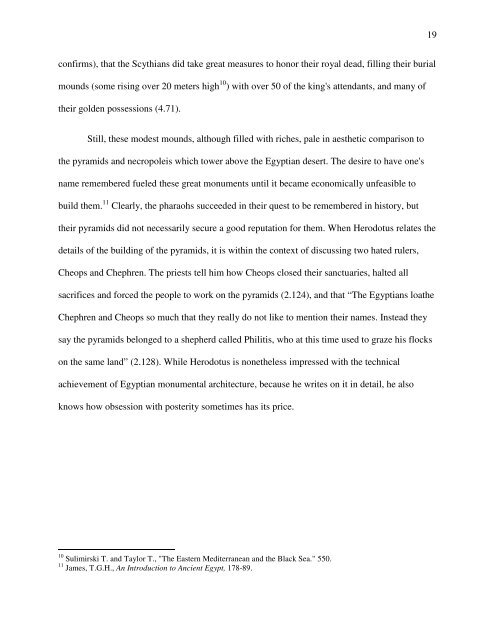The Old and the Restless - The Egyptians and the Scythians in Herodotus' Histories by Robert J. Hagan
You also want an ePaper? Increase the reach of your titles
YUMPU automatically turns print PDFs into web optimized ePapers that Google loves.
19<br />
confirms), that <strong>the</strong> <strong>Scythians</strong> did take great measures to honor <strong>the</strong>ir royal dead, fill<strong>in</strong>g <strong>the</strong>ir burial<br />
mounds (some ris<strong>in</strong>g over 20 meters high 10 ) with over 50 of <strong>the</strong> k<strong>in</strong>g's attendants, <strong>and</strong> many of<br />
<strong>the</strong>ir golden possessions (4.71).<br />
Still, <strong>the</strong>se modest mounds, although filled with riches, pale <strong>in</strong> aes<strong>the</strong>tic comparison to<br />
<strong>the</strong> pyramids <strong>and</strong> necropoleis which tower above <strong>the</strong> Egyptian desert. <strong>The</strong> desire to have one's<br />
name remembered fueled <strong>the</strong>se great monuments until it became economically unfeasible to<br />
build <strong>the</strong>m. 11 Clearly, <strong>the</strong> pharaohs succeeded <strong>in</strong> <strong>the</strong>ir quest to be remembered <strong>in</strong> history, but<br />
<strong>the</strong>ir pyramids did not necessarily secure a good reputation for <strong>the</strong>m. When Herodotus relates <strong>the</strong><br />
details of <strong>the</strong> build<strong>in</strong>g of <strong>the</strong> pyramids, it is with<strong>in</strong> <strong>the</strong> context of discuss<strong>in</strong>g two hated rulers,<br />
Cheops <strong>and</strong> Chephren. <strong>The</strong> priests tell him how Cheops closed <strong>the</strong>ir sanctuaries, halted all<br />
sacrifices <strong>and</strong> forced <strong>the</strong> people to work on <strong>the</strong> pyramids (2.124), <strong>and</strong> that “<strong>The</strong> <strong>Egyptians</strong> loa<strong>the</strong><br />
Chephren <strong>and</strong> Cheops so much that <strong>the</strong>y really do not like to mention <strong>the</strong>ir names. Instead <strong>the</strong>y<br />
say <strong>the</strong> pyramids belonged to a shepherd called Philitis, who at this time used to graze his flocks<br />
on <strong>the</strong> same l<strong>and</strong>” (2.128). While Herodotus is none<strong>the</strong>less impressed with <strong>the</strong> technical<br />
achievement of Egyptian monumental architecture, because he writes on it <strong>in</strong> detail, he also<br />
knows how obsession with posterity sometimes has its price.<br />
10 Sulimirski T. <strong>and</strong> Taylor T., "<strong>The</strong> Eastern Mediterranean <strong>and</strong> <strong>the</strong> Black Sea." 550.<br />
11 James, T.G.H., An Introduction to Ancient Egypt, 178-89.
















